Criminalizing Dissent, Death Penalty, FBI Intrusion, Green Scare, Human Rights, Prison Industry, Supreme Court, Surveillance, Truth to Power
Podcast: Play in new window | Download
Updates:
———-
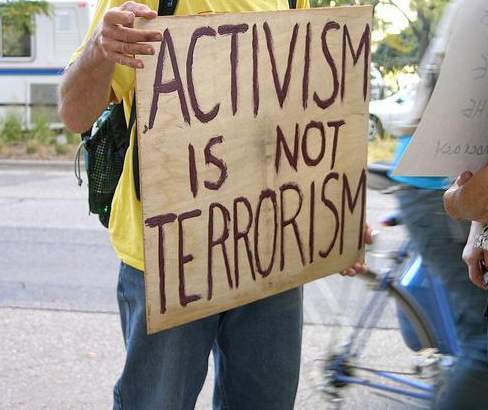

Nationally Coordinated FBI Raids Minnesota/Chicago
Last week the FBI raided six homes in Minneapolis and two in Chicago allegedly searching for links to terrorism. The Minneapolis raids targeted anti-war activists among them, Jessica Sundin, and Mick Kelly. They were key organizers of the big march on the first day of the RNC in 2008. In one Minneapolis home, FBI agents arrived with warrants, searched every room, attic and basement, looking through CDs DVDs, books, and photos. Passports, travel and phone records were among items seized from the homes. The FBI issued subpoenas for the peace activists to appear before a Grand Jury in Chicago on October 12. FBI’s search warrants indicate agents were looking for connections between local antiwar activists and groups in Colombia and the Middle East. NLG HOTLINE – 888-654-3265
Jim Fennerty:
- We’re putting a group of lawyers together from the National Lawyers Guild. We’re speaking to our clients right now about what a grand jury is, how it functions, and they have a right to refuse to testify at a grand jury or not. A total of 12 people were served with subpoenas.
- Humanitarian Law Project decision emboldens the government to push the envelope and see what they can get away with. I have not been told that anyone is a target, and we’re concerned about what that means.
- Technically the Attorney General’s office is not suppose to issue a subpoena to a target unless they get a higher authority to do that. Historically a grand jury was supposed to be citizens coming together to determine if charges should be filed criminally against somebody.
- Now it’s pretty much a rubber stamp for what the prosecutors want. People should be very concerned about going there, because what you say can be twisted around.
- Most cases, people can say they don’t want to testify at a grand jury, they’re going to exercise their fifth amendment rights against incrimination. However, if they offer you immunity and you refuse to testify, you can be taken to a judge, they’ll read the questions to the judge, and ask you to answer them.
- If you refuse to answer them then a judge can hold you in civil contempt and you can be incarcerated for the length of the remaining time of the grand jury. The government is not showing us all their cards, we don’t know where they’re going with this.
- Regarding activism: I’ve seen some unity here I’ve never seen before in my life, where groups that don’t get along, are now rallying around them.
- Do not speak to federal agent, do not lie to a federal agent. National Lawyers Guild Issues New Report on Policing of Protests
Guest – Attorney Jim Fennerty, attorney, activist and National Lawyers Guild member. Jim has been handling activist cases for 38 years.
——-


Death Penalty Cases -Virginia / Georgia / California
In late 2009, The American Law Institute which created the intellectual structure for the current capital justice system for nearly 50 years, essentially announced that its project has failed. The New York Times, in one article wrote the institute’s move represents a tectonic shift in legal theory. The article also points out that capital punishment was plagued by problems including racial disparities. We continue to see these types of problems in 3 recent death penalty cases in Virginia, Georgia and California. In Virginia, Teresa Lewis, a grandmother was the first woman to be executed in that state in nearly 100 years. Last week Teresa Lewis was given a lethal injection at 9PM in Greensville prison. Teresa was convicted of hiring two gunmen to shoot her husband and stepson to collect on their life insurance policy. Both gunmen were sentenced to life without parole. Attorneys argued that the court consider a key piece of evidence on Teresa’s behalf. That evidence was a letter from one of the gunmen who killed himself in jail in 2006, in which he claimed full responsibility for the murder plot and suggests he pushed Lewis into it. Lewis also had an IQ of 70.
Last week in a Georgia death penalty case, Brandon Joseph Rhode was found in his cell with his arms and neck slashed days before his scheduled execution by lethal injection. According to reports, his lawyers have pleaded clemency, arguing he suffered brain injury from alcoholism and because his mother took drugs during pregnancy. If executed, he will be the 25th person put to death by the state, the last one was in June. Rhode and an accomplice were sentenced to death for murdering an 11-year-old boy, his 15-year-old sister and their father during a botched robbery in 1998.
In California, a federal and state court judge refused death row inmate Albert Greenwood Brown’s request to block his scheduled execution. Brown and another death row inmate have filed a lawsuit challenging the state’s new lethal injection regulations,saying the procedures were improperly adopted. State procedures have since been revised after a federal judge halted the death penalty in California amid concern that it’s method lethal injection amounted to cruel and unusual punishment.
David Michaels:
- These are two horrible executions. Teresa Lewis had an IQ of 72. She was executed after Governor MacDonald refuse her clemency requests. The judge said she was the head of the serpent in this particular case and he decided horribly to have her executed.
- There’s no deterrent for people with the IQ of 72 or for someone with an IQ of 150. This murder happened in 1992, this execution happens in 2010.
- There are about 3 dozen states that have capital punishment laws. In California, one of the drugs they use for lethal injection has expired and they can’t get anymore.
- LINKS – NCADP / Death Penalty Information Service
Guest – Attorney David Seth Michaels. David has represented clients for 30 years, clients such as prison inmates in Mississippi and Tennessee. He’s worked with Brooklyn Legal Services B and with the Federal Defenders Service Appeals. He is also a novelist, has his own practice in New York. David Michaels’ Blog
—-


Circuit Court of Appeals Throws Out Nigerian Claims Against Shell Oil
It is now up to the Supreme Court to decide if corporations could be held liable in U.S. courts for violations of international human rights law. Recently, a U.S. Appeals Court dismissed a case against Royal Dutch Shell in which the oil company was accused of helping Nigerian authorities violently suppress protests against oil exploration in the 1990s. One judge on the three-member appeals court panel wrote a strong dissent of the majority opinion, calling it “a substantial blow to international law.” In a past interview with attorney Peter Weiss, Peter explained how a 1789 U.S. statute Alien Tort Claim was used to hold multinational corporations accountable for human rights crimes. The case was brought by families of seven Nigerians who were executed by a former military government for protesting Shell’s exploration and development.
Maria LaHood:
- This was a class action brought by the Ogoni people against Shell parent companies and Nigerian subsidiaries.
- They brought the case because Shell had been complicit with the military dictatorship in the nineties.
- They were detaining, torturing and killing people to oppress the grassroots opposition movement to Shell’s environmental degradation. Shell Oil is the US company.
- Basically, two judges went out of their way to find that corporations can’t be held liable for international human rights violations. The result is that corporations can profit from killing and torturing and can’t be required to compensate the victims.
- Hopefully this decision won’t stand. This is the first Circuit to rule like this.
- Unfortunately I think corporations are going to be submitting this decision in their own cases around the country. Hopefully, that won’t be successful. As it stands the decision applies to the Second Circuit, New York, Connecticut and Vermont.
- Even if this decision stands, the court left open and confirmed you can sue individuals. Even here we can sue CEOs and directors of corporations.
Guest – Attorney Maria LaHood has worked on the case Wiwa v. Royal Dutch/Shell, for the torture, detention and execution of Ken Saro-Wiwa and other human rights activists and protesters in Nigeria. Maria LaHood joined the Center for Constitutional Rights (CCR) in 2004. She specializes in international human rights litigation, seeking to hold government officials and corporations accountable for torture, extrajudicial killings, and war crimes abroad.
————————————————————————————————-
Civil Liberties, Criminalizing Dissent, Habeas Corpus, Human Rights, Military Tribunal, Political Prisoner, Prison Industry, Supreme Court, Targeting Muslims, Torture, Truth to Power
Podcast: Play in new window | Download
Updates:
—
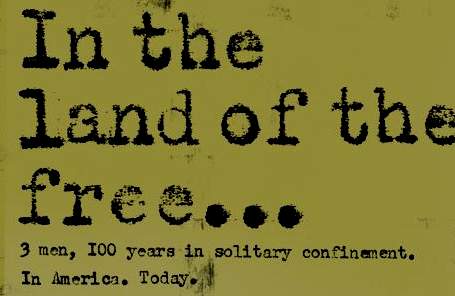
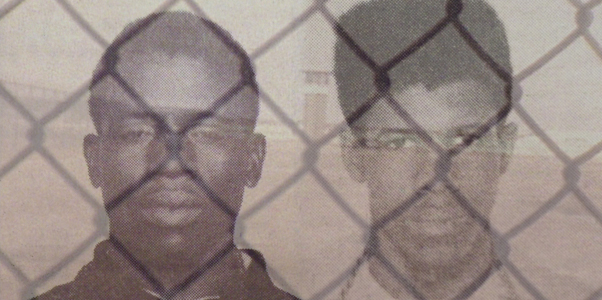
In the Land of the Free, a film by Vadim Jean
Director Vadim George joins us to discuss his recent documentary film “In the Land of the Free.” As many listeners may know, the Angola 3 are Robert King, Albert Woodfox and Herman Wallace. Each had arrived to the Louisiana State Penitentiary in the late 1960s. While in prison, and in contact with Black Panthers, the men helped build a prison chapter of the Black Panthers. They organized inmates to end systematic rape and violence and worked as jailhouse lawyers. The men have spent a combined century in solitary confinement in the Angola prison. Vadim’s powerful documentary explores the issues of accountability and examines the biases against the sentencing of African Americans compared to Whites and Latinos. The film is narrated by Samuel L. Jackson, and it’s noted toward the end, that there is a pending civil suit ‘Wilkerson, Wallace and Woodfox’ vs the State of Louisiana, ruled by the US Supreme Court and to go to trial based that their 30+ years in solitary confinement is “inhumane and unconstitutional”. This case could stop long-term solitary confinement in US prisons.
Vadim Jean:
- I was friends with Anita Roddick, she knew Robert King, and when she passed away in 2007, Robert King was one of the speakers at her memorial. They wouldn’t let me film in the prison.
- The Angola 3 came together in the New Orleans parrish prison in the 1970s.
- The criminals were put in with the Black Panthers and the Black Panthers educated the criminals.
- In the 1970s Angola was the bloodiest prison in America.
- Robert King was told why he was kept in solitary confinement after 25 years in CCR (solitary confinement)
- Because he was being investigated for the murder of Brent Miller, which happened when he wasn’t even in the prison. They’re incredible human beings. They’re strong men. They’re self educated, in prison.
- I think they have their side, the fact that they know they’re innocent, and that makes you strong, that’s made them incredibly strong. They refused to be beaten.
- Robert is free. His conviction was overturned in 2001. People have reacted strongly to the film.
- I’ve tended to make drama comedies. I made a completely mad film called Jiminy Glick in Lalawood with Martin Short.
- I made this film for Anita. (Anita Roddick) The Roddick Foundation.
Guest – Vadim Jean, began his career directing commercials for products such as Blockbuster Video, Woolworths, The Observer and Mercury 121 Mobile Phones. He then moved on to music videos for Elton John and Oasis before co-directing his first feature film, Leon the Pig Farmer (1992). For his work he won an Evening Standard British Film Award for Most Promising Newcomer, a Chaplin Award for Best First Feature at the Edinburgh International Film Festival.
——–


Law and Disorder Barack Obama Series – CCR Staff Attorney Shane Kadidal
We’re joined by Center for Constitutional Rights staff attorney Shane Kadidal to give us an overview on several critical topics we’ve been following over the years here on Law and Disorder. We look at what is happening in Guantanamo right now, the Obama policy of preventive detentions and the state of Habeas Corpus in the United States. In January of 2009 Barack Obama issued orders to close Guantanamo Bay prison. There was talk of transferring prisoners to a supermax prison in the United States. Military tribunals move forward for Guantanamo prisoners.
Shane Kadidal:
- What we won is the right to get into court and challenge the legality of your detention. CCR won that in 2008
- Obama gets into office and says he’s going to close Guantanamo Bay Prison in a year.
- Obama to set up expert agency to decide what to do with people in Guantanamo prison
- About 50 cases have gone forward and we (CCR) won 72 percent of the cases
- About 180 left in Guantanamo. Obama has improved physical conditions for detainees in Guantanamo, but they’re still stuck there. Nothing much has changed, we see stasis, there isn’t much political movement.
- About a month into the administration, the Obama Department of Justice says our position is the same as the Bush administrations on Bagram AFB prison
- We’re taking the same legal position about executive power as the previous administration – state’s secrets about rendition
- Six hundred people in Bagram right now. Bagram is an active war zone, can’t have courts interferring
- About 30 of the remaining 180 in Guantanamo will be charged. Most of the people brought there were innocent. The victim of profiling policies.
- General Stone says 400 of the 600 hundred in Bagram Prison have done nothing and should be released immediately. Task Force report on Guantanamo prisoners. 10 percent leaders of Al-Qaeda, 20 percent had a logistics role, others are low level soldiers. This is false.
- There are innocent people in Guantanamo, who have been there for 8 years.
- We still have a military commissions, an indefinite detention system. Lieberman proposing to strip citizenship from terrorism suspects so they can be interrogated without Miranda warnings.
- Moving Guantanamo Prison to Thomson Prison in Illinois.
- Obama as committed to removing checks on executive power
Guest – Shane Kadidal senior managing attorney of the Guantánamo Global Justice Initiative at the Center for Constitutional Rights in New York City. He is a graduate of the Yale Law School and a former law clerk to Judge Kermit Lipez of the United States Court of Appeals for the First Circuit.
Past shows with Shane Kadidal
Civil Liberties, Criminalizing Dissent, Habeas Corpus, Human Rights, Iraq War, Supreme Court, Targeting Muslims, Torture, Truth to Power
Podcast: Play in new window | Download
Updates:
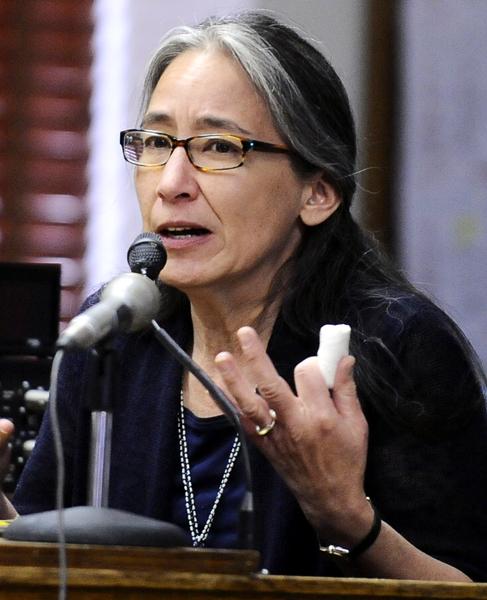
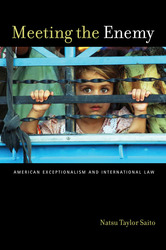
Natsu Saito, Meeting the Enemy: American Exceptionalism and International Law
Meeting the Enemy: American Exceptionalism and International Law is the title of Natsu Saito’s recent book, Natsu is an attorney and professor of Law at Georgia State University’s College of Law in Atlanta. The book boldly points out how the United States violated international law since its declaration of independence. As often discussed here on Law and Disorder, international courts and institutions have been at the forefront of holding the torture conspirators accountable. Meeting the Enemy gives disturbing insight into the origins of American exceptionalism.
Natsu Saito:
- The duality is that the US does exempt itself (from international law) very consistently and very frequently and yet promotes international law very strongly and relies upon it.
- It has relied upon certain premises that are fundamental to the whole outlook and paradigm of colonialism – which is that there is a higher good, a more civilized approach the US embodies.
- The law doesn’t apply because we have a higher aim of civilization and that justifies not playing by the rules.
- The United States making others comply with human rights standards while exempting itself.
- Moving humanity toward this higher goal is so critical because if you strip that away and you look at the realities on the ground, you see what has been termed Western civilization has been incredibly barbaric.
- In order to get around that analysis, you have to say it was for a higher good.
- I think the “left” tends to accept the general framework, and to make particular criticisms of policies and practices that are obviously problematic. The US government engaging in torture for example, but each instant is accepted as anomalous instead of the larger picture.
- It is too frightening even for the people on the left to deal with the reality that this is a country that sits on occupied land, illegally occupied by its own rules. People on the left want to make it a kinder, gentler colonialism.
- I started out thinking I was writing a book about the failure of the United States failure to comply with international law, as I got into it, the more interesting questions were the push / pull dynamics between reliance on international law
- The current system of international law evolved from the international law which was the agreement between the European colonial powers of how they were not going to destroy each other in the process of taking over the rest of the world.
Guest – Natsu Taylor Saito teaches international law and human rights, race and the law, immigration, criminal procedure, and professional responsibility, and is an advisor to the Asian American Law Student Association and the Hispanic Student Bar Association. Professor Saito’s scholarship focuses on the legal history of race in the United States, the plenary power doctrine as applied to immigrants, American Indians, and U.S. territorial possessions, and the human rights implications of U.S. governmental policies, particularly with regard to the suppression of political dissent. Read more.
——-
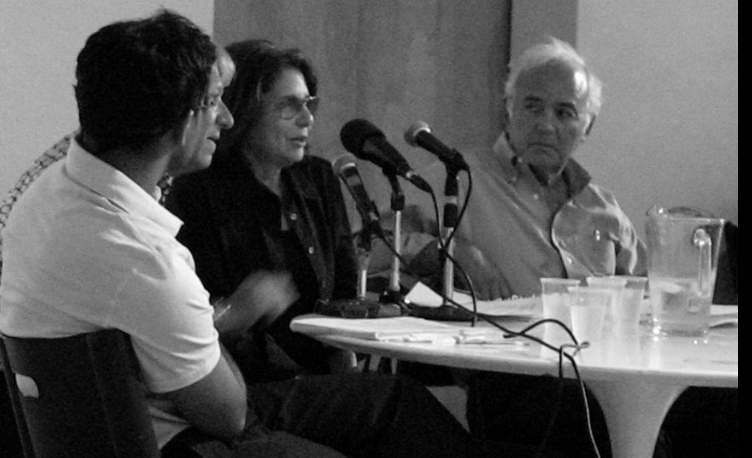
Elena Kagan and the Supremes – Brecht Forum
We hear excerpts from a discussion on the confirmation hearings of Elena Kagan, and how her position may influence the direction of the Supreme Court.
Panelists:
Martin Garbus – one of the country’s leading trial lawyers. Mr. Garbus aggressively represents his clients in the courts and in the media. He has appeared before the United States Supreme Court as well as the highest state and federal courts in the nation. His devotion to ethics, justice and the law has earned him respect among the legal community and beyond as well as prominent awards. Time Magazine has named him “legendary . . . one of the best trial lawyers in the country,” while Newsweek , the National Law Journal and other media agree that Mr. Garbus is America’s “most prominent First Amendment lawyer,” with an “extraordinarily diverse practice.” The National Law Journal named him one of the country’s top ten litigators.
Margaret Ratner Kunstler – former Educational Director at the Center for Constitutional Rights. She’s an attorney and leads the New York City chapter of the National Lawyers Guild and heads the William Moses Kunstler Fund for Racial Justice.
Anand Swaminathan – an associate at Vladeck, Waldman, Elias & Engelhard, P.C. He graduated from the University of Wisconsin in 2001 and the Harvard Law School in 2006. Prior to joining Vladeck he was a law clerk for the Honorable Theodore H. Katz of the United States District Court for the Southern District of New York.
Michael Steven Smith – Law and Disorder co-host, author and New York attorney. Michael Steven Smith is the author, editor, and co-editor of six books, including “The Emerging Police State,” by William M. Kunstler. He has testified before committees of the United States Congress and the United Nations on human rights issues. Mr. Smith lives and practices law in New York City with his wife Debby, where on behalf of seriously injured persons he sues insurance companies and occasionally the New York City Police Department.
———————
Civil Liberties, Extraordinary Rendition, Guantanamo, Habeas Corpus, Human Rights, Supreme Court, Torture, Truth to Power
Podcast: Play in new window | Download
Updates:
—
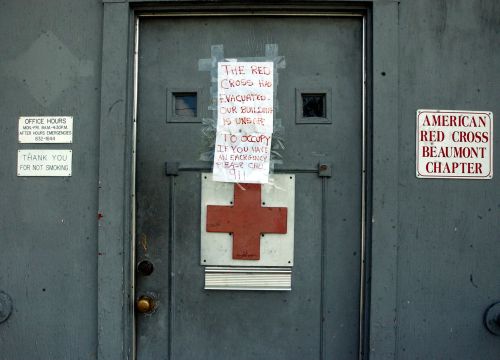

Labor Relations at the American Red Cross and It’s Impact on Employee and Donor Safety (PDF)
Hosts look at a suprising report detailing the cost cutting efforts within America’s premier disaster relief and blood donor organization, the American Red Cross. Award winning Washington based reporter Philip Dine has put together an investigative summary titled – (PDF)Labor Relations at the American Red Cross and It’s Impact on Employee and Donor Safety that enumerates the effects of cut backs that have led to bad labor relations, bungled disaster relief, mishandled blood supplies and federal fines. The investigation examines a far less publicized issue that involves the treatment of Red Cross employees and the impact this has on the organization’s work, with high turnover, younger employees and lower wages.
Philip Dine:
- Over the years, the Feds saw that the Red Cross was not living up to its promises.
- Red Cross labor relations: For years the Red Cross has been intent on degrading the training and expertise of the employees.
- At one point you needed doctors on site for blood drives, then it became registered nurses, then it became nurses on call, and then non-medically trained supervisors.
- It seems that the Red Cross wants to have more management control and lower pay and that basically means a disposable work force.
- Management mess: 10 Executive directors in 12 years.
- High turnover at the top, a budget deficit, despite the main money maker – the blood supply which they get for free. It accounts for 2/3 of revenue. Calling for an audit
- Workers increasingly hired from fast food outlets with no experience, workers see co-workers improperly inserting needles into people. More articles
- I’ve been covering labor for 25 years/ Please contact Philip Dine directly at – philipmdine@aol.com
Guest – Philip Dine author of “State of the Unions: How Labor Can Strengthen the Middle Class, Improve Our Economy, and Regain Political Influence.” Philip Dine is teaching a labor-management course at the George Washington University School of Business this fall. State of the Unions has won honorable mention for best book about labor or work of the past five years from the United Association for Labor Education.
———–
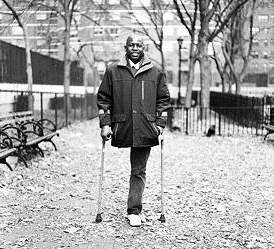

Medical Students Advocate Against Health Professional Participation in Torture
Last year it was confirmed that doctors and psychologists were directly involved in the supervision, design and execution of torture at U.S. military and intelligence facilities. This is a violation of state laws and professional ethics. These “health professionals” that were involved in the torture still hold their professional licenses to practice. Legislation introduced in New York by Assemblyman Richard Gottfried and Senator Tom Duane would reinforce existing ethical and legal responsibilities by prohibiting state-licensed doctors and other health professionals from participating in such practices. The law would also call for legal protection to resist and report any involvement in acts of torture and abuse. Last week, medical students and health professionals descended on Albany to meet with law makers to advocate the passage of this historic legislation. Physicians For Human Rights / When Healers Harm
Dr.Allen Keller:
- If you’re a health professional that participated in torture, you can lose your license.
- Health professionals were front and center and complicit in this policy of torture.
- Medical professionals provided sanitizing and rationalization for those infamous torture memos.
- During water-boarding there would be a doctor there. This is clearly a breach of medical and professional ethics.
- Licenses issued by the state. Torturers relied heavily on medical opinion.
- The state chapter of the New York Psychological Association has endorsed this bill.
- What I believe is that the interrogator looks at the health professional and says, well, if it gets out of hand, the medical professional will stop me.
- Suvivorsoftorture.org – The Bellevue/NYU Program for Survivors of Torture provides comprehensive medical and mental health care, as well as social and legal services to survivors of torture and war traumas and their family members. In the past year alone we provided these multidisciplinary services to more than 600 people from 70 countries.
Guest – Dr. Allen Keller, founder and director of the Bellevue/NYU Program for Survivors of Torture. In addition to serving as a primary care physician for many patients in the Program (Dr. Keller speaks French and Spanish). Dr. Keller oversees and coordinates the provision of medical services for Program patients, working with other primary care physicians and medical specialists affiliated with the program.
———————————————–
Civil Liberties, Criminalizing Dissent, Habeas Corpus, Human Rights, Military Tribunal, Supreme Court, Torture, Truth to Power
Podcast: Play in new window | Download
Updates:
——
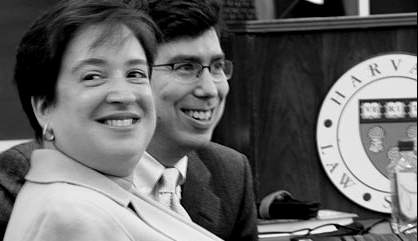
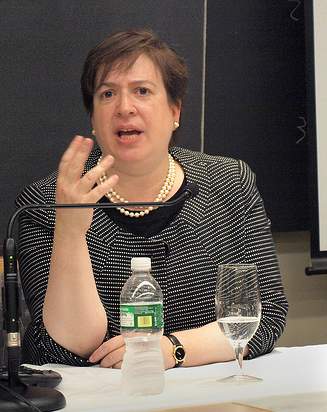
Kagan “Loves” the Federalist Society
Hosts discuss Elena Kagan’s background with Francis Boyle, Professor of law at the University of Illinois. Boyle is author of “Tackling America’s Toughest Questions.” In his article titled – – Supreme Court Pick: Kagan “Loves” the Federalist Society, – – Boyle notes Kagan explicitly endorsed the Bush administration’s bogus category of ‘enemy combatant,’ whose implementation has been a war crime in its own right. He also writes that “Kagan has actually said ‘I love the Federalist Society.’ Almost all of the Bush administration lawyers responsible for its war and torture memos are members of the Federalist Society. Read – Dean Elena Kagan: Harvard’s Gitmo Kangaroo Law School — The School for Torturers
Law Professor, Francis Boyle:
- She has fully defended the hideous Bush atrocities, civil rights, human rights, civil liberties.
- No retreat or abandonment of the Bush positions.
- She (Kagan) did write this tome in the Harvard Law Review, equivalent to the Federalist Society, unitary executive power theory of the presidency.
- She’d be a total disaster on the cases that really count for the future of the US Constitution and the Bill of Rights.
- She’s a neo-conservative and has no qualifications to speak of.
- (She) hired Jack Goldsmith, author of torture memos and helped set up kangaroo court system in Guantanamo. We are still fighting Kagan supporting the Bush war on terrorism.
- Kagan stated on National Public Radio on December 22, 2009, “I Love The Federalist Society”
- Obama and his people know that Kagan will be the spear carrier for presidential powers on the Supreme Court
- This is a very dangerous time for the future of our republic and Constitution. The statement that she cares for the common people. . . she’s an elitist snob.
- There she is promoting globalization at Harvard Law School?? Hiring people to teach “globaloney” just to lick the boots of Larry Summers? While dean at Harvard Law School, she was moonlighting at Goldman Sachs payroll.
- This is all incredibly incestuous. Unlike Bush who wasn’t a lawyer, Obama taught Constitutional Law at the University of Chicago Law School, he should know better.
Guest – Professor Francis Boyle, A scholar in the areas of international law and human rights, Professor Boyle received a J.D. degree magna cum laude and A.M. and Ph.D. degrees in political science from Harvard University. Prior to joining the faculty at the College of Law, he was a teaching fellow at Harvard and an associate at its Center for International Affairs. He also practiced tax and international tax with Bingham, Dana & Gould in Boston.
He has written and lectured extensively in the United States and abroad on the relationship between international law and politics. His eleventh book, Breaking All the Rules: Palestine, Iraq, Iran and the Case for Impeachment was recently published by Clarity Press. His Protesting Power: War, Resistance and Law has been used successfully in anti-war protest trials.
——-



In Memory of Attorney Rhonda Copelon
Hosts talk with Cathy Albisa, executive director of the National Economic and Social Rights Initiative. about the human rights legacy of Rhonda Copelon. Rhonda had a huge influence on changing international law for human rights. She founded the International Women’s Human Rights Law Clinic.
Lawyers You’ll Like series with Rhonda Copelon. Part 1 / Part 2.
Attorney Cathy Albisa:
- I worked with Rhonda at CUNY, we both co-counseled with CCR on a couple of cases.
- I met Rhonda on a car ride, a 25 hour car ride. We spent 25 hours talking about human rights in the United States. Rhonda had a huge influence on NESRI
- Rhonda never stopped lamenting Harris v McRae, she was still furious and outraged.
- The assumption embedded in that case is the court is saying, we’re not responsible as a society, the poverty of this woman. Copeland Fund For Gender Justice. Rhonda thought it was critical that a progressive gender perspective be embedded into some body of work that really looked at these gender issues in a cross cutting way, that understood the relevance of poverty, the relevance of race, the relevance of sexual minorities.
- Rhonda was not a wealthy woman, she was a law professor and saved her money. She gave 1 million dollars for this fund and that was everything. The case that she says always saved my life was Filártiga v. Peña-Irala.
- She founded the International Women’s Human Rights Law Clinic. What she did with that clinic is challenge the traditional model of human rights law coming out of the United States.
- She made no claims of being objective, she was on the side of victims, of people with similar politics to her own.
- This changed international law. Rhonda: Don’t disregard the banal, the ordinary things that actually represent deep violations.
- The way Rhonda went about things, she merged intellectual capital with a strategic ferocity and personal good will and relationship building.
- She thought it was very important that people understand they’re part of a broad social justice and human rights movement.Cathy Albisa joins us today to talk about her work with the National Economic and Social Rights Initiative and Rhonda’s work as legal adviser to the Women’s Caucus for Gender Justice.
Guest- Cathy Albisa, is a constitutional and human rights lawyer with a background on the right to health. Ms. Albisa also has significant experience working in partnership with community organizers in the use of human rights standards to strengthen advocacy in the United States. She co-founded NESRI along with Sharda Sekaran and Liz Sullivan in order to build legitimacy for human rights in general, and economic and social rights in particular, in the United States.
——————————————–
Civil Liberties, Criminalizing Dissent, Gaza, Human Rights, Prosecution of the Bush Administration, Supreme Court, Surveillance, Targeting Muslims, Torture
Podcast: Play in new window | Download
Updates:
—
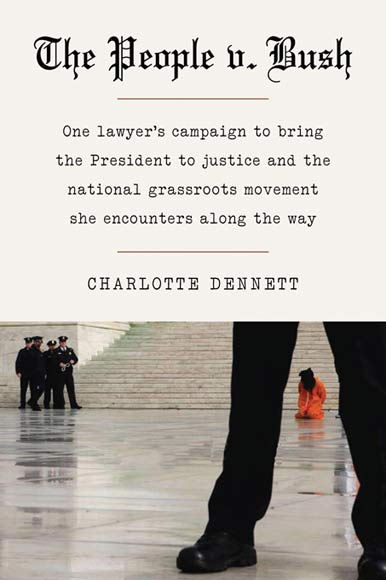
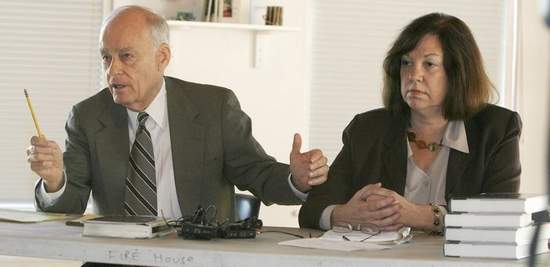
People v Bush, Charlotte Dennett
Today we talk with former Vermont Attorney General Candidate Charlotte Dennett. Listeners may remember Charlotte ran for office of Attorney General on the platform that if elected she would immediately undertake the prosecution of George W. Bush for the unnecessary deaths of Vermont soldiers in Iraq. The strategy was to establish jurisdiction in the cases for Attorneys General in each state as outlined in The Prosecution of George W. Bush for Murder, written by former prosecutor Vincent Bugliosi. Charlotte Dennett didn’t get the votes to become Vermont’s new attorney general. Now, a year later Charlotte describes from an inside perspective the “accountability movement” in her new book titled The People v. Bush. Is impeachment or prosecution still off the table?
Charlotte Dennett:
- If we don’t act on them now, then the impunity will get worse, we have to clamour for Cheney’s prosecution. We’ve got to keep the pressure on the department of justice. We know that the Spanish prosecutors have done that.
- I’ve come to realize that Obama’s mantra that we have to move forward and not look backward is really translated into: Don’t Prosecute.
- Brennan who was involved with crafting torture policy is playing a role advising Obama not to prosecute.
- It’s up to the accountability movement to step forward. There are going to be major events on March 20th, the anniversary of the war on Iraq.
- In my book the People v. Bush, I’ve got 10 pages in the appendix of all the different resources that people can turn to, to pressure Congress, sign petitions.
- The first half of the book is about my campaign for attorney general in Vermont, where I pledged to prosecute Bush for murder. I also lay out the evidence of how we can still do this, we can still do this by the way.
- I became hooked on accountability, this is a struggle for democracy and the soul of our nation.
- The book also looks at how the Obama Administration deals with the crimes of its predecessors.
- I have to tell you Michael Ratner, you were one of the first people to start raising the alarms (Obama Administration). My book shows the gradual shock and disillusionment of his supporters.
- People are upset that John Yoo, is doing talk shows, he showed up on John Stewart recently (OUCH)
- Regarding Sen. Leahy of Vermont: I tracked his effort to put together a truth commission and not prosecution. There were 37 towns in Vermont, that in their town meetings, voted for impeachment.
Guest – Charlotte Dennett, is an author and attorney who resides in Cambridge Vermont. She and her husband, Gerard Colby, have lived in Vermont since 1984. Charlotte has been practicing law since 1997, representing injured Vermonters in negligence, medical malpractice and wrongful death cases, as well as civil rights litigation and family law, and has argued before the Vermont Supreme Court.
——-

Lawyers You’ll Like: Center For Constitutional Rights Legal Director, Bill Quiqley
This week, CCR Legal Director Bill Quigley joined Law and Disorder hosts during a marathon 3 hour fund raiser for Pacifica’s WBAI. Bill talked about his trip to Gaza during Operation Cast Lead, his recent trip to Haiti and his death penalty work in Louisiana.
Bill Quigley:
- I went to Gaza with activist Audrey Stewart and Kathy Kelly, an International Peace Activist.
- We went over there, a year ago January, while the bombing was still going on. We were on the Egyptian side of the border where we could see the bombing of Gaza
- There were constant drones going over head, they had aerial balloons that were doing surveillance. It was sort of like a sociopath beating a baby. There was no defense, there was no anti-aircraft, people were literally sitting ducks.
- In my life, it compared to a time when one of my clients was being executed, in death row in Louisiana. To see the apparatus of the state, move into action, very calm, step by step.
- Then with full force and the respect of state behind it, pull on a switch and my client was no more. (at that time) It was a surprise that anyone in the U.S. would support the Palestinians.
- Death Penalty: there really is a community of deathy penalty advocates who train themselves how to communicate with juries. It is trending in the right direction by it still continues as a terrible tool, that the state has an opportunity to use when they choose to.
- Stop and frisk case update: New York is fighting this every step of the way. The term they use to justify this is: Furtive activity
- Culture of Intimidation: If young men don’t look at them the way they want to be looked at, if people don’t recognize their presence with the kind of respect that the police department thinks that they’re entitled to by the mere fact that they’re wearing a uniform and carrying a weapon.
- It is something that clearly could stop if the message was sent from the top.
- But clearly something has a green light from the top to engage in this. Authoritarian order that inconsistent with law and order, with the constitution.
- Endemic: If you have a society that values violence, the violence we institute around the world, the way we support Israel, the way they deal with Palestine. If we value deep racism, then what else what would we expect from a police or a military. The police and military are tools of a violent and racist regime.
- Part of our job is to re-educate police officers. We are going to be engaged in this activity over again, in every city in the country in varying degrees. The root problem is that we have a racist and violent criminal justice system, education system, a racist and marginalizing housing system, employment system.
- Most people don’t have the educational opportunities to know what’s going on with Haiti, Gaza, Iraq and even within our own country. Haiti: You could travel for miles and see no indication that international community even cared about what happened in Haiti. Most people were under a sheet or a blanket, could break some of the sun.
Guest – Bill Quigley. Bill is the Legal Director for the Center for Constitutional Rights, a national legal and educational organization dedicated to advancing and defending the rights guaranteed by the United States Constitution and the Universal Declaration of Human Rights. Bill joined CCR on sabbatical from his position as law professor and Director of the Law Clinic and the Gillis Long Poverty Law Center at Loyola University New Orleans. He has been an active public interest lawyer since 1977.
———————————————-










